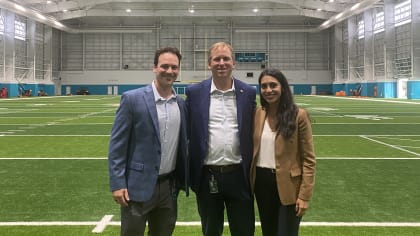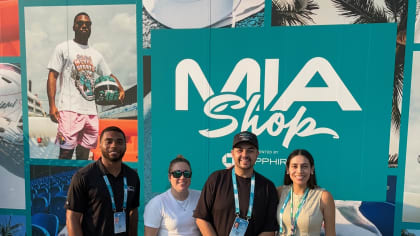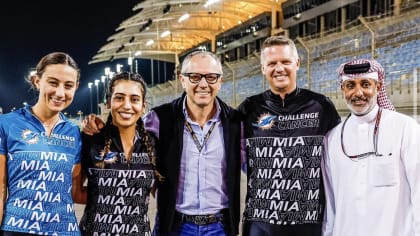Next Woman Up: Darline Llamas Llopis, Vice President of Finance & Retail for the Miami Dolphins
- Next Woman Up: Hannah Gordon
- Charlotte Jones
- Amina Edwards
- Kim Pegula
- Katie Blackburn
- Tina D'Orazio
- Tina Tuggle
- Gayle Benson
- Kim Rometo
- Ashley Lynn
- Karen Murphy
- Amy Sprangers
- Lara Juras
- Megan McLaughlin
- Nadege Pluviose
- Kalen Jackson
- Nancy Meier
- Kelly Kleine
- Mindy Black
- Hayley Elwood
- Sarah Hogan
- Chanelle Smith-Walker
- Gina Newell
- Molly Higgins
- Tiffany Morton
- Maria Rodriguez
- Chloe Janfaza
- Gabrielle Valdez Dow
- Kristi Johnson
- Kelsey Henderson
- Fouzia Madhouni
- Jackie Maldonado
- Stephanie Kolloff O’Neill
- Alexandra Cancio-Bello
- Ashton Washington
- Qiava Martinez
- Remi Famodu-Jackson
- Emily Starkey
- Ciara Burgi
- Robin DeLorenzo
- Marissa Figueroa
- Angela Baker
- Emily Griffin
- Phoebe Schecter
- Alexis Dotson
- Nancy Gold
- Ameena Soliman
- Tameka Rish
- Sarina Soriano
- Maria Gigante
- Ebony Short
- Shelly Harvey
- Sarah Mallepalle
- Maya Ana Callender
- Melainey Lowe
- Donny Brock
- Lacy Ekert
- Sarah Evans
- Darline Llamas Llopis
- Jaemin Cho
- Blayre Holmes Davis
- Michelle Xiao
Women are rising up the ranks throughout professional football, earning positions of power in a space that for too long was ruled almost exclusively by men. We’re seeing more and more women breaking barriers in the sport, but what are the stories beyond the headlines? Who are the women shaping and influencing the NFL today? Answering those questions is the aim of the Next Woman Up series. While the conversational Q&As are edited and condensed for clarity, this is a forum for impactful women to share experiences in their own words. Without further ado, we introduce:
Darline Llamas Llopis, Miami Dolphins
Position: Vice President, Finance & Retail
How did you get your start in a career in sports?
My passion for sports has been lifelong. As a child, I recall bonding with my father over soccer games, as we rarely watched television otherwise. Big games or a boxing match would become a communal affair, and this sense of community is what I found so appealing about sports. I attended the University of Southern California during the Pete Carroll era, so college football was a significant part of my university experience. Even though I loved USC football during that period, I never really saw football as a potential career. To me, football was more of a recreational activity, while people pursued different fields for their livelihood.
Post-school, I found employment at several accounting firms. During my time in Dallas, a client inquired if I knew of anyone in Los Angeles who’d be interested in a position with the Rams. After discussing it with my husband, I expressed my interest to the client. Once I secured the position with the Rams, my superior informed me that my client and friend had penned a highly favorable recommendation for me. I always remind people that you never know who you’re conversing with. I was oblivious to the fact that my Dallas client had connections at the Rams, and that this would pave the way for a new opportunity for me.
Before I began my job with the Rams, I was aware of my love for it. My previous experience in finance and accounting is quite similar to the work I did outside of sports. However, being a part of an organization like the Rams and the NFL, which affects people so positively, was truly extraordinary. It was an industry I knew I wanted to continue being a part of.
What was your role with the Rams and how does it differ from your current role with the Dolphins?
I came in as controller with the Rams, managing finance aspects of the business. The team had moved from St. Louis to L.A. the year before I got there in 2017, so it had been running on bare bones. The finance department was a three-person team at the time, so I came on to help my boss, Jeff Brewer, ramp up that team, get processes in place and get back to budgeting. It was a really exciting time — we went to the Super Bowl in the 2018 season, along with growing and learning from the team and all of the intricacies of working in the NFL.
Then, I came over to Miami as the vice president of finance, and one of the first assignments I received from Tom Garfinkel, Dolphins vice chairman, president and CEO, was to do some analysis on whether we should bring our stadium retail in-house. I did all this research, punched the numbers and made a presentation. Then I went to him and said, “I think we can make a little more money, but the main reason to bring it in-house is we can have more control over our brand.” For anyone who runs retail, it’s more about margin and how much money they’re making and less about the brand. He turns to me and says, “I totally agree. You should go do that.”
Therefore, I utilized all my connections to assemble a team, with a nine-month deadline to launch it. One of my friends from the Rams joined us and has been instrumental in managing this department. We’ve achieved remarkable results and managed to portray our brand from a unique perspective. In terms of sales, we’ve experienced a significant increase. However, our brand management, collaborations, and the products we’ve released have truly struck a chord with our fans.
I also do finance, payroll — and procurement is a department we started a little over a year ago. We do so much across Hard Rock Stadium, with the Dolphins, events, concerts, Formula One Miami Grand Prix and Miami Open. Last year, I focused a lot on the grand prix, making sure we had processes in place for all of the finances and how we thought about our products. That event is very different from the Dolphins. For the football team, it’s, These are the seats, this is what we’re selling. With F1, we put it up and take it down every year, so we also change things every year. We’re constantly discussing the amount of grandstand seats, hospitality locations and the fans. So we’re working across all of our departments with ticketing and campus experience to try to come up with a consolidated plan, which makes it exciting and dynamic.

That makes total sense. What would you say is the biggest challenge of your position?
Every department in a business has unique goals to fulfill. For departments that interact directly with fans, the aim is to provide the best possible experience. While the finance department is always there to offer support, its role also involves evaluating the advantages and disadvantages of various decisions. We provide a reflective perspective to help departments determine the most effective course of action. Sometimes, there may be minor resistance, but we thrive when we can foster partnerships and collaborate with other departments. It’s a mutual understanding that we all strive for the best outcomes for the business, fans, and players, so it’s about finding ways to achieve this together.
When looking at the football team, the Dolphins have so many star players right now. Does that have any sort of influence on finance and retail?
The excitement undoubtedly increases with star players and victories, a fact I believe everyone would agree with. From a financial perspective, we do observe a rise in ticket sales, retail, and partnerships. However, the intriguing aspect of my job is that we must ensure we are bringing value to all of our stakeholders, regardless of our field performance. We are, after all, managing a business and aim to generate unforgettable moments, irrespective of wins or losses. The challenging periods on the field often lead to fascinating times in the front office, offering numerous learning opportunities in both situations.
To illustrate, during my time with the Rams, organizing the Super Bowl in Atlanta was a massive endeavor. We were hustling to maintain cohesion amongst the team, while also closely monitoring our finances. We had the pleasure of dispatching three chartered jets to the Super Bowl, carrying family and friends. Despite the fun, our primary focus was on execution and ensuring everything ran smoothly during that period.
Having been in Miami for three seasons, do you have a favorite moment so far?
After completing our first Formula One race, a sense of achievement permeated our organization. The massive task of ensuring the event proceeded seamlessly was a considerable undertaking. Considering the size of our organization and the vast number of properties we manage, this was truly exhilarating.
In the realm of football, it was post our inaugural game that we decided to internalize our retail sector. I distinctly recall hustling about, organizing and shifting hangers. It was a significant achievement, a project that the team had invested a year into. Seeing it materialize and being an integral part of it was immensely satisfying. I have never exerted myself that much ever before, which has instilled in me a deep respect for retail workers. The job is tremendously challenging, and given its stark contrast to finance, I found it personally fulfilling.

I want to pivot to mentorship. Do you have mentors who have helped you along the way? And if so, what advice have you received from them?
I’ve been fortunate to benefit from numerous mentors, some aware of their influence, others likely oblivious to the profound impact they’ve had on me. Numerous exceptional individuals have provided valuable advice and guidance, significantly enriching my life. A key lesson I’ve learnt is the importance of sharing credit. No one operates in isolation and no one achieves anything single-handedly. Realizing a goal requires collective effort, thus it’s essential to acknowledge the hard work of others as much as your own.
Another takeaway I love is this: To be clear is to be kind. Sometimes having those hard conversations — or people having those hard conversations with you — makes it easier to meet and exceed expectations all around. I do take that to heart. Sometimes it’s easier to not have those conversations because it can be uncomfortable, but it’s best to be clear.
And what advice do you have for other women looking to get into a career in football?
The industry is challenging yet highly desirable. Many people often perceive it as being divided into football and ticket sales, but there’s a lot more to it. Even if you don’t start working in sports immediately after college, there’s still an opportunity for you to break into the industry. Building the right skill set is crucial to add significant value when you transition to sports. Being authentic is also essential. If it’s the right fit for you and the proper time, your persistent efforts will pay off. Additionally, flexibility and mobility can foster your career growth.
That’s good advice. Now back to you. What is next in terms of what you want to accomplish?
Tom Garfinkel always says, “Always be learning.” That has always been my mantra. If I feel stagnant or if I’m not learning as much anymore, that’s when I know it’s time for me to go find my next thing. When I came to Miami, I told my boss, Chris Clements, that I want to be a CFO. I came to Miami because he’s one of the best and I want to learn from him. He’s been an amazing mentor to me, and I want to make sure I keep learning so I can take that next step.

And lastly, what are you most proud of?
I’ve had the privilege of working alongside some truly extraordinary individuals. I’ve watched as the retail team was built and saw them flourish, handling a multitude of tasks from the Dolphins and F1 to the upcoming Taylor Swift Eras Tour. They’ve even won the NFL Club Retailer of the Year award, and I couldn’t be prouder of their growth and accomplishments.
The finance team has also made significant strides. When I first joined, the focus was predominantly on revenue. However, we started having conversations about the importance of considering profit margins. After all, the amount of revenue doesn’t matter if the expenditure is equal. This shift in perspective was a drastic change, but seeing how our organization has adopted this new way of thinking has truly highlighted the impact of our team.


